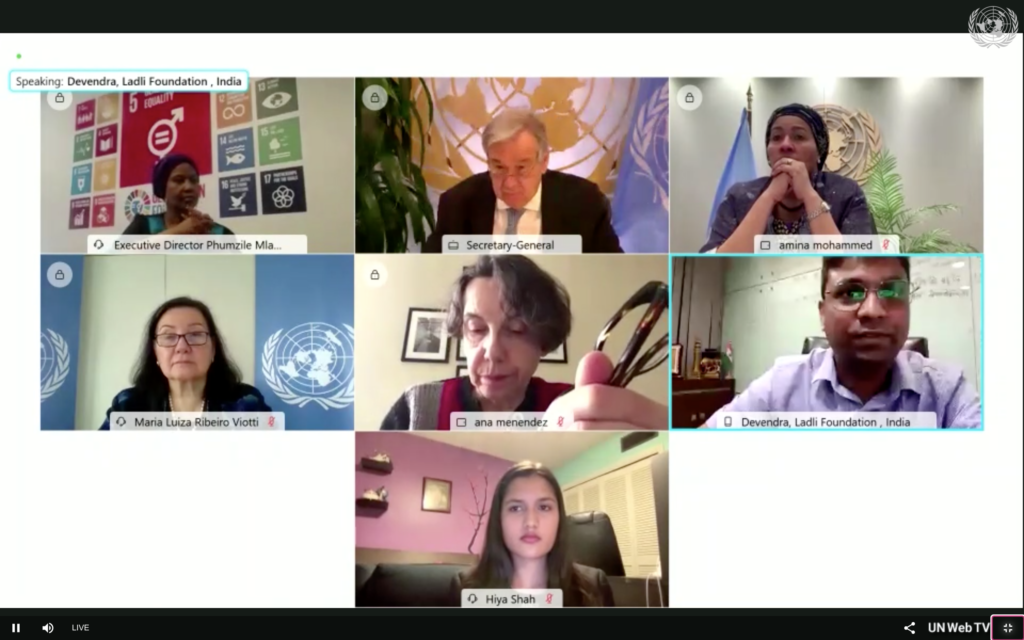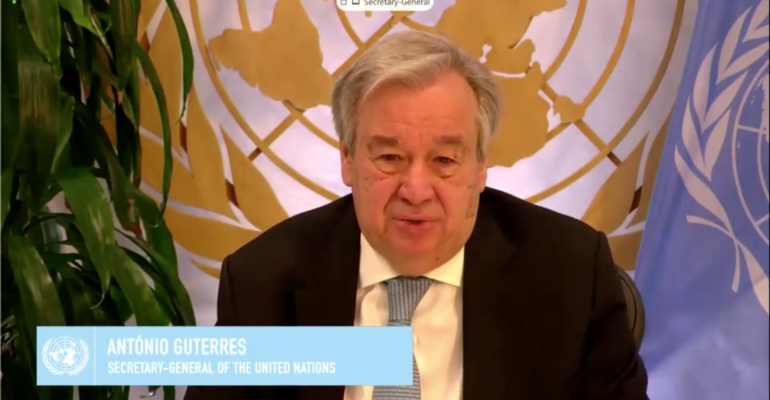Blog by Francesca Fletcher Williams, SI Global Policy Coordinator
16 March 2021 saw civil society representatives virtually meet with United Nations (UN) Secretary-General António Guterres to share their opinions and to ask him questions about gender equality and the impacts of COVID-19. The UN is often criticised for being “a talking shop”, but opportunities like these allow civil society representatives to exchange views frankly and freely with the UN about what actions are needed to achieve gender equality.
The Townhall discussion focused upon how the impacts of COVID-19 have revealed and accentuated the discrimination that women and girls face. UN Women Executive Director Phumzile Mlambo-Ngcuka set the scene, sharing how globally, national COVID response task teams comprise of 80% men, even though we know that the pandemic “cannot be solved by men alone”. Guterres also spoke candidly, saying that gender inequality has “become a shadow pandemic” and that the impacts of COVID-19 have been “devastating on women’s rights”. He called for more partnerships between civil society. While Soroptimist International knows that civil society organisations would welcome these partnerships, Member States often lack political will to act on gender inequality. The challenge we now face is how to encourage those partnerships and make them effective.

Screenshot of the speakers on the Virtual Townhall Meeting.
A team of four Soroptimists joined the interactive Townhall event with UN Secretary-General António Guterres: Bev Bucur, International Director of Advocacy; Cathy Standiford, Past President of SIA; Carolien Demey President Elect of SIE; and Rita Nogueira Ramos SIE Vice-President of Advocacy.
For Carolien Demey, this Townhall was galvanising and solidified what CSW can do:
“This was a moment when you can feel what Soroptimism really means: all together uniting our forces to forward gender equality.”
It was a youth representative, Hiya Shah, member of the UN Generation Equality Youth Planning/Advisory Group, who asked what Guterres called “the one million dollar question”: how do we hold states accountable and make them abide by international law? In response, Guterres said that he had to speak the truth – that “systems for accountability are weak” and national sovereignty can produce obstacles which prevents people from being held accountable. “We have to recognise this”, he said, “because only by recognising it can we make progress”.
Ultimately, CSW has a lot to do with accountability. It provides organisations like Soroptimist International with the opportunity to ask governments why they haven’t acted on their words, why they haven’t achieved their commitments, and why women, girls and gender equality still aren’t being treated as priority issues. Now as the world tries to recover from COVID-19, gender equality must be placed at the heart of national recovery plans to make the world more sustainable. Going back to normal is not good enough, as Guterres said, “It is clear that what was ‘normal’ was discriminatory and unsustainable”.
For Cathy Standiford, the Townhall put women’s leadership at the centre of the solution:
“At the Townhall meeting, the Secretary-General reiterated that ‘gender equality is a question of power’, which requires ‘many more women in positions of leadership to change the power structure’. By working to educate and empower and enable women and girls, Soroptimists have an important role in helping his words become a reality.”
One way to make sure COVID-19 recovery is gender-responsive is to ensure that women are leaders and decision-makers – which is what this CSW is all about. Perhaps more countries should adopt Guterres’s activist approach. At this Townhall, he was clear that he could not wait the 130 years it would take for gender parity to happen “naturally”. Instead, he strongly supports the use of quotas. His own use of them at the UN has meant that women hold 50% of UN leadership positions that he can appoint. It is this kind of positive action that could stop national COVID task forces from being dominated by men, which we know means that women and girls are being left behind in COVID recovery efforts.
Advocacy in Action: What happens next?
We don’t have to wait for the UN to organise events in order to ask questions or share Soroptimist International’s views. You can stay involved in CSW this year by reaching out to your state’s delegation and asking them what they are doing to promote women’s leadership and decision making, to ensure women’s and girls’ participation in public life and to make sure gender equality is embedded in all COVID-19 responses.
Here are some ideas for questions you can ask:
- Part of ensuring women’s leadership at the UN is increasing the space for civil society. Changes in consultation and inclusion processes because of COVID-19 has really narrowed opportunities for us to engage. How will your office support increased inclusion of civil society during negotiations? What commitments will your government make?
- States have long agreed in writing that women need to be leaders and decision makers, yet we’re still waiting for meaningful change. What needs to happen at CSW to make that change happen?
- When women are leaders, their excellent track records speak for themselves. Actions and programmes are more sustainable, peace becomes longer lasting, and societies become less fragile. But still there are so many barriers to women’s leadership – we need to bridge the gap between saying women’s leadership is essential, knowing they excel in leadership positions, and ensuring women’s equal participation. Civil society has always said and shown this, now governments need to act. What can be done to promote action?
- Both before and during COVID-19, many governments have cut funding to organisations which provide essential services to women and girls, including shelters, healthcare services and others. At the same time, they expect these organisations to be doing more and responding to COVID-19. What needs to happen for governments to recognise the hypocrisy of this approach?
To watch the recording of the Virtual Townhall Meeting, click HERE.

